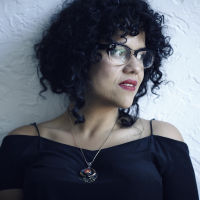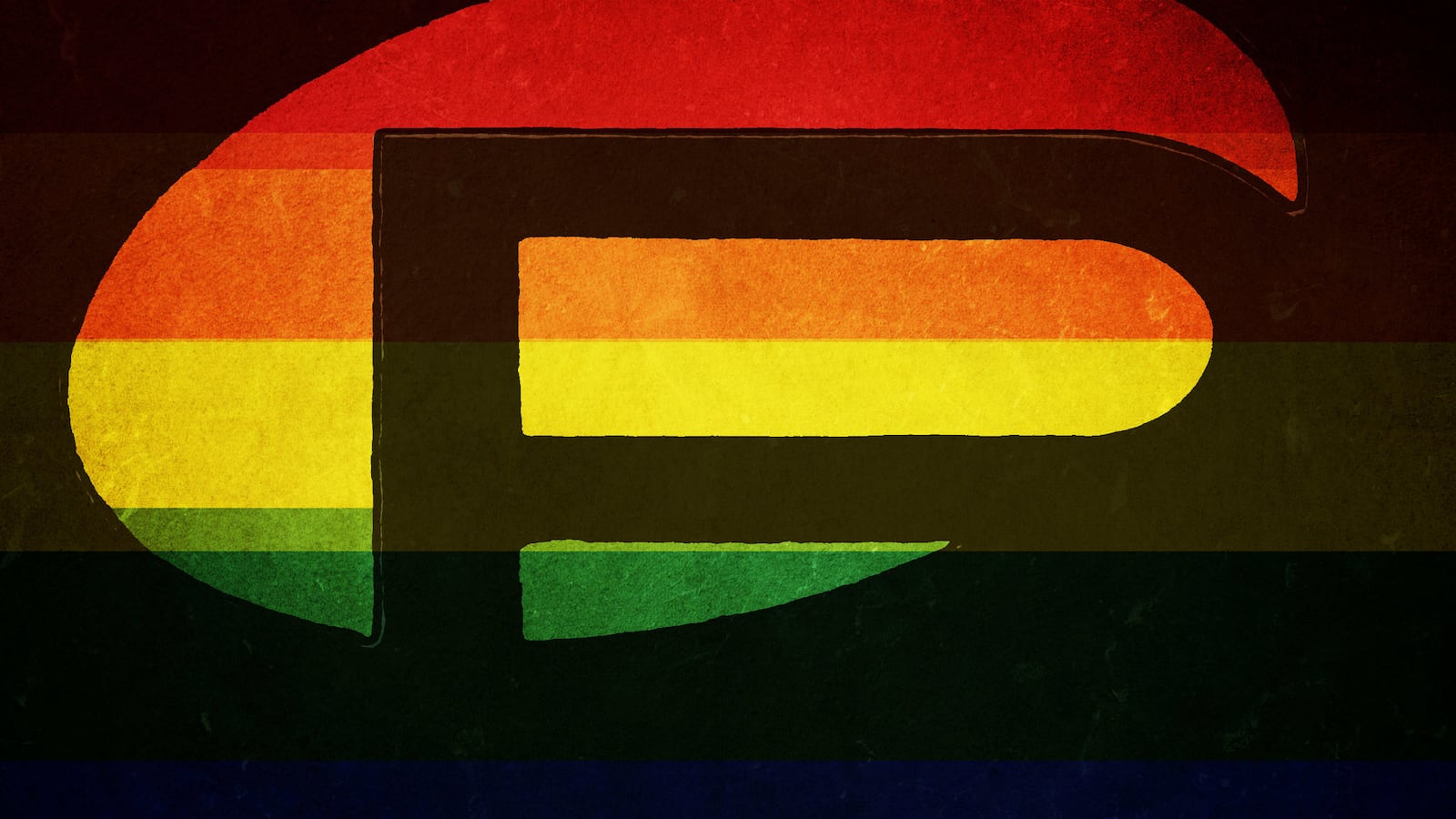I went to my first gay club in Gainesville, Florida, in 1999. I was 19—a chubby, bookish virgin who’d hightailed it out of Orlando right after high school. Growing up in Orlando in the ’90s, I’d been smothered by the overwhelming sameness of the strip malls, the canned Disneyfication that passed as entertainment, the oppressive unity of girls that all wore overalls. When I finally had a chance to escape to college, I only made it as far as Gainesville—a two-hour drive—and in many ways, the University of Florida didn’t feel far enough. Too many sorority girls, too much football. Freaks like me were few and far between.
But over time, I found some cracks in the homogeneity and pushed my way through them. I took up smoking outside the dorm, and met some similarly disaffected kids. I enrolled in Gay and Lesbian Literature and made my first openly gay friend. And through him, I ended up at the gay bar: the predictably named University Club, or UC, as everyone called it. There, I bumped into one of my young English profs, a tow-haired, bouncing nerd who lassoed me on the dance floor and showed off his sprinkler moves. UC was where I took ecstasy for the first time. I put glitter on my face and wore Spice Girls platforms with my cargo pants. I made out with a gay guy who told me I was beautiful. The drag queens affectionately called me “fag hag” and “fruit fly.”
In retrospect, none of it was particularly edgy. This was not some legendary downtown New York leather bar. But for a geeky Puerto Rican girl from the Orlando suburbs, it felt like another planet. For years, everything about me had been wrong: my hair, my body, my brain, my hobbies, my ethnicity. At UC, none of it mattered.
What if someone had burst into UC and ripped holes into it while I danced some night? What would have become of us then?
I’ve thought about UC a lot since last Sunday. I’ve never been to Pulse, and yet, I feel like I can understand what it meant to the people who worked and partied there. Yes, club life can be fleeting; we forge substance-fueled intimacies that barely last a night. We sweat, we crush against one another, we ogle and objectify. But gay clubs like Pulse are also places of refuge. When everywhere feels wrong—home, school, church—where do you go?

I’ve spent a lot of time in the past four years thinking about these questions while making a personal documentary called Memories of a Penitent Heart. As he lay dying of AIDS in 1987, my uncle Miguel was pressured by his devout Catholic mother to repent his homosexuality. A generation later, I decided to make a film about it in order to understand my uncle and his choices. In the process, I discovered that when he was a teenager trying to figure out how to be gay in Puerto Rico, Miguel found his own Pulse, too. It was a club in San Juan called Bachelor. It lasted a little over a decade; in the nineties the owners died of AIDS and a neighboring businessman mowed the club down, turning Bachelor into a parking lot.
In the past four years I’ve tracked down a lot of people who clocked time at Bachelor—former DJs, performers, and patrons. They all say there was nothing like it: “the Studio 54 of Puerto Rico.” But it was also way, way more than that. Bachelor was a place that obliterated boundaries—rich and poor, gay and straight, white, black, and all the in-betweens that Puerto Ricans are. People at Bachelor put on plays, they fled their shitty home lives, they learned they could dance, entertain, and above all, thrive.
Just a few weeks ago, Memories of a Penitent Heart screened in Orlando at the Florida Film Festival. It was my hometown screening: My whole family turned up, my eighth grade reading teacher turned up, my childhood best friend’s mom turned up. And all the gay people I know in Florida turned up. So on Monday, as the shooting started to finally sink in, I realized, holy shit—I could have had friends inside that club. I checked all their Facebook pages. Safe. Safe. Safe. Safe.
Safe. Every town, every city has its Pulse, its UC, its Bachelor. These are spaces of refuge, of safety, of sanctuary. Traditionally, “sanctuary” was a religious word, meaning a sacred space in a church where fugitives from danger would be protected from persecution. A sanctuary, above all, offered refuge, comfort, a place to rest one’s head for a night. Violence was totally prohibited. But for many queer people, “sanctuary” in the religious sense has never existed. Yes, some churches have been the exception—but over and over again throughout history, queer people have fled their churches and sought sanctuary elsewhere. For many, clubs like Pulse have provided that sanctuary. And on Sunday, a possibly closeted homophobe violated this sacred—yes, sacred—space.
Over the past week, I’ve been trying to figure out how to grieve with Pulse just like everyone else. But I’ve also been troubled by fleeting expressions of solidarity: people changing their Facebook profile pictures to the Pulse logo, writing things like “We are Orlando,” “We are One,” etc. The trouble with these kinds of slogans—I am you, you are me—is that they try to eradicate our differences, to create unity by covering over the unique factors that distinguish this shooting from the others that came before it. For example, the mainstream media has barely noted that the overwhelming majority of people who died were Latinx. If you look at the list of the dead—and if you haven’t, I urge you to do so—it’s blatant. Sotomayor. Gonzalez-Cruz. Torres. Flores. Velazquez. Rivera.
Why should this matter? Because for queer people of color, the need for sanctuary is that much greater. Seventy percent of anti-LGBT murder victims in the U.S. are people of color. LGBT people of color are more likely to live in poverty. The risk of youth suicide is higher. They are more likely to get kicked out of their homes. Cultural forces—such as strong family traditions, gender policing like machismo, and entrenched religious homophobia—often work together in especially poisonous ways.
I’m not trying to establish a hierarchy of suffering, as if to say that if the people at Pulse that night had been white, it would be somehow less or more awful. Nor am I trying to establish a special club of mourners that excludes white/straight/insert-category-here people. Heck, I certainly don’t hold the right membership card: I left Orlando, I never danced at Pulse, I’m married to a man, etc. But I am saying that we should be paying attention to the differences between us, so that we can be connecting the dots of marginalization in this situation.
Memories of a Penitent Heart is a film about how people abuse religion in ways that damage LGBT people. At the same time, it is not a film that demonizes religion per se. Religions don’t discriminate: People discriminate. Religions don’t kill people: People kill people. And since Sunday, I’ve begun to see that it’s not just queer people who need sanctuary right now. There is a connection between the violation of safety that happened at Pulse and the way that “us vs. them” rhetoric is now helping to deny sanctuary to others. MSNBC and CNN are sounding the alarm on ISIS, Hillary’s amping up her anti-terror stance, and Donald Trump has taken us one step closer to internment camps and gold stars.
Everyone deserves sanctuary: LGBT people, Muslims, asylum seekers, immigrants, people of color, indeed, anyone living vulnerable lives. And I refuse to let other hate crimes be perpetuated on the backs of this one. This is where we are headed, if we aren’t careful: standing by while whole groups of people are rounded up because of the actions of a very sick man who had access to weapons he should never have had; stoking the never-ending war in the Middle East; refusing to provide sanctuary to refugees from conflicts that we’ve helped to create. To me, the only way from here is unshakeable solidarity and resistance, not despite our differences, but because of them.
My wish? That they re-open Pulse and name it Sanctuary.
Cecilia Aldarondo’s personal documentary Memories of a Penitent Heart had its world premiere at the 2016 Tribeca Film Festival and will be broadcast on POV in 2017. Aldarondo is assistant professor of Film Studies at Skidmore College and has been named by Filmmaker Magazine as one of 2015’s “25 New Faces of Independent Film.”





